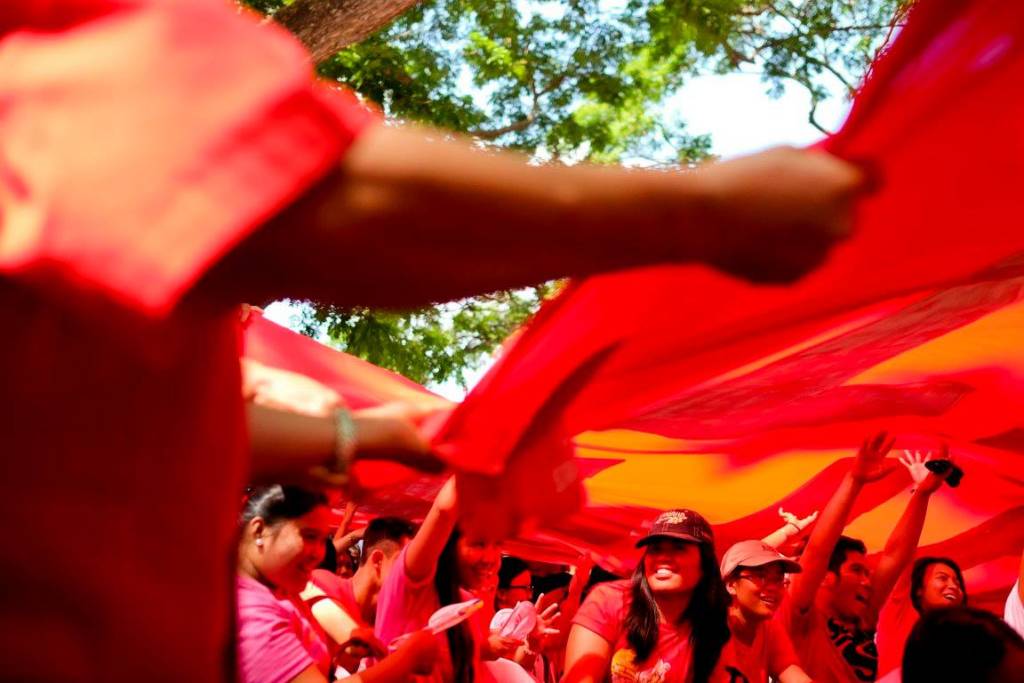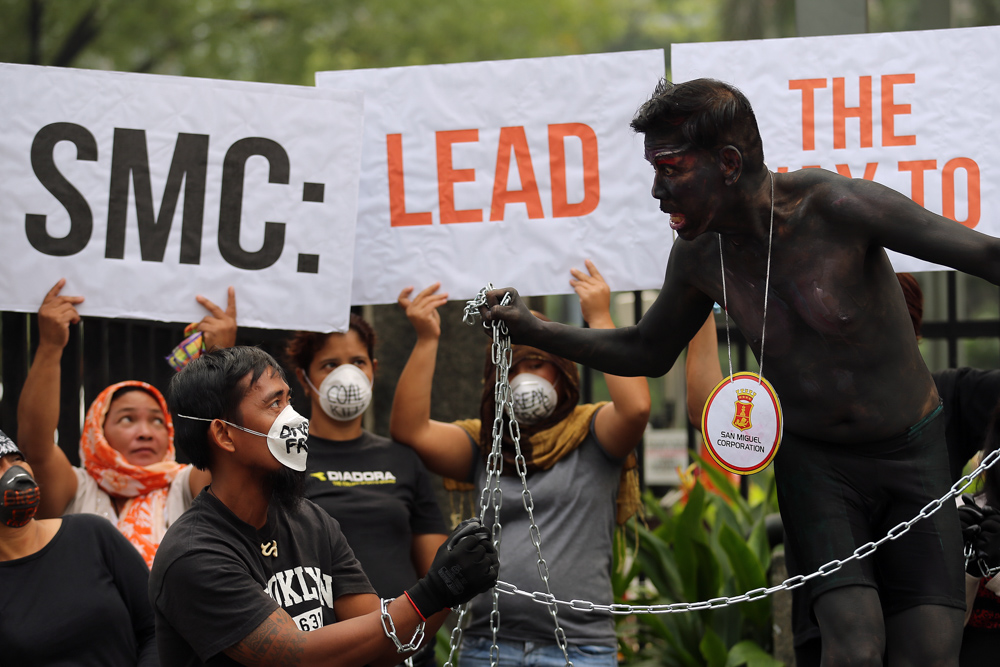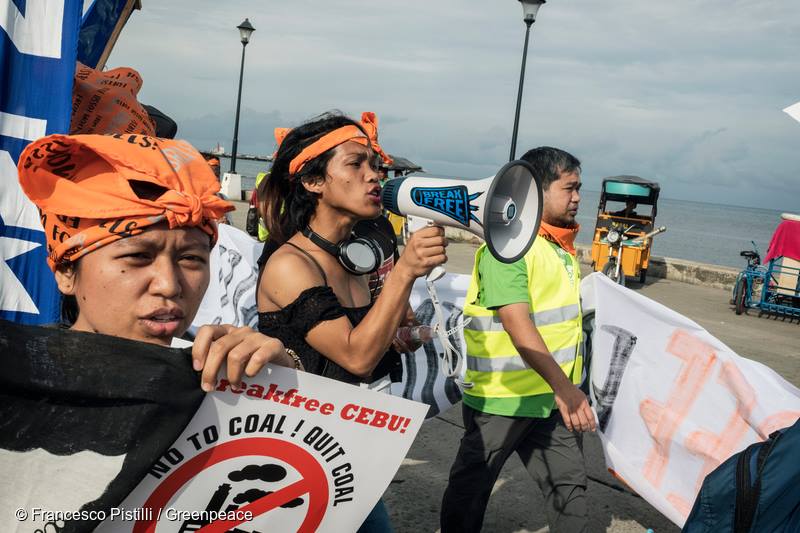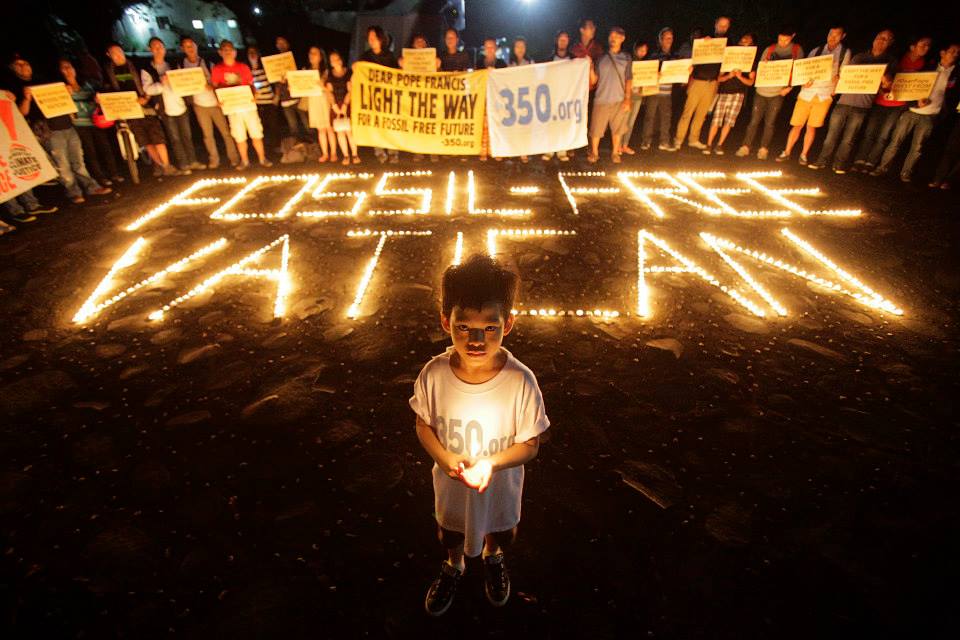By Chuck Baclagon
Last year, 10,000 people took to the streets in Batangas City to defend their hometown from the invasion of dirty energy. The event was monumental because it was the biggest act of public protest against coal plants in the Philippines.
The mobilization was part of Piglas Pilipinas!, a nationwide campaign for the Philippines to break free from fossil fuel, beginning with coal. Building on the efforts and achievements of various anti-coal campaigning initiatives, Piglas Pilipinas! aims to take the anti-coal struggle to a higher level with a clear call and direction towards a fossil-free future.

Batangas residents take the streets to say no to coal. Photo: Veejay Villafranca/Institute for Climate & Sustainable Cities
The campaign was powered by the united efforts of different organizations and movements across the country, which in turn drew strength from local community actions as well as provincial and national campaigns.
The march was a watershed moment for the movement because the growing resistance against fossil fuels has reached national consciousness. Moreover, the movement showed force outside the country’s capital in Manila, where almost all the dirty energy and extractive industries thrive to the disadvantage of the communities that hosted them.
In a span of weeks, a dozen more actions in several provinces followed.
Barely a month following the mobilization, the Batangas City council voted to allow the construction of the coal plant against the wishes of the residents and communities in the proposed construction site.
However, what could be seen as a campaign setback in fact birthed a movement broader than any localized opposition to a single project. It highlighted the need for more action to keep fossil fuels in the ground and an acceleration in the just transition to 100% renewable energy. These mobilizations have shed light on those needs, helped spread information about crucial local campaigns to fight fossil fuels, and continued to shift political power away from the fossil fuel industry – and towards grassroots groups who are at the frontlines of a great energy and economic transformation.
Civil society organizations engaging with energy policymakers were able to boost the Climate Change Commission’s position that coal is not compatible with the 70% initial pledge of the Philippine government towards the Paris Agreement. This materialized in the Climate Change Commission’s resolution for a “comprehensive review” of the government’s energy policy, which is expected to reshape the country’s power development plans and replace coal with renewable and indigenous sources of energy. Alongside this energy policy review was the Department of Environment and Natural Resources’ energy audit which intended to halt new projects and review the environmental permits filed by coal companies.
Just last March 14, the Philippines ratified the Paris Agreement in spite of the initial delays driven by Duterte’s hesitation to sign it. The climate movement was able to turn around his position and the senate voted unanimously to ratify the treaty.
One year later: The struggle to break free still stands
In spite of these recent developments, much still needs to be done. It is still urgent to join forces with communities in vulnerable situations against extreme weather, climate impacts, and especially against the corporations which have contributed to the climate crisis.
Energy Secretary Alfonso Cusi recently said he would not put a cap on the the use of coal in spite of the country’s recent ratification of the Paris Agreement. But communities refuse to be silent; they are once again taking the streets and demanding freedom from coal.

Coal-affected communities held a lightning rally in front of the San Miguel Corporation (SMC) headquarters Photo by Greenpeace
In Manila, coal-affected communities trooped to the corporate headquarters of San Miguel Corporation (SMC) last March 13 to demand the shutdown of its coal facilities in Limay, Bataan. Their coal plant and open stockpile have been implicated in causing sores, irritations, and cardiovascular ailments among the people living nearby. Residents believe that it is a travesty that SMC’s coal plant continues to operate despite its harmful impacts to the health and environment.

Communities called for a coal-free Cebu, and stood in solidarity with the global movement to Break Free from fossil fuels. Photo: Francesco Pistili/Greenpeace
Meanwhile, in Cebu, community representatives, environmental activists, and civil society groups led a 60-kilometer “climate walk” tracing the path of existing and proposed coal plants in the province last March 15 to 18. They started their journey near the Aboitiz-led power plant in Toledo City, stopped halfway at the Kepco SPC Power Corporation plant in Naga City, and ended the walk at the Ludo project site, in the heart of the province’s capital. The action culminated with the unfurling of a floating banner near the site of the proposed Ludo coal-fired power station by a stand-up paddling group to convey Cebuanos’ strong opposition to the project.
Changing the discourse in the other venues
Too often, climate activists tend to forget that beyond the streets, there are other arenas of struggle that need to be won.
Filipino activists have also started doing work in demonstrating that the business plan of the fossil fuel industry is in no way compatible with the need to act on climate change, and have called on various institutions to get rid of stocks, bonds or investment funds that are invested in dirty energy development.
When Pope Francis visited the Philippines in 2015 hundreds gathered in Manila for a vigil calling on the pope to divest the Vatican from fossil fuels.

Faith-based communities and climate justice groups held a candlelight vigil to call on Pope Francis to lead on climate action by committing to divest from fossil fuels. Photo: LJ Passion
The voice of coal and climate impacted communities from the Philippines were among those that were heard during the Norwegian Parliament’s review of its sovereign fund which resulted in the issuance of a recommendation to divest its country’s sovereign wealth fund from the coal industry.
It is in these forums that institutions are hold accountable and are made to put their money where their mouths are. To translate commitments into mechanisms and put in place systems that pave the way for low carbon development. It tells a story of power and its reversal where the vulnerable are turned champions and leaders of the fight to thrive amidst the adverse impacts of a warming climate.
These things alone is not enough to save the climate, but they are vital milestones that set the trajectory for action that will build the momentum for transitioning to a low carbon future.
Challenging the social license of the fossil fuel industry
“I do think trust has been eroded to the point that it is becoming a serious issue for our long term future. If we are not careful, broader public support for the (fossil fuel) sector will wane. This is the biggest challenge we have at the moment as a company … The fact that societal acceptance of the energy system as we have it is just disappearing.” – Shell CEO, Ben Van Beurden, March 2017
This stunning admission from the boss of one of the world’s largest fossil fuel companies is the clearest sign we have so far that the divestment campaign being ran alongside other climate struggles is having the desired effect — each act of divestment erodes the public’s acceptance of dirty energy and opens up political space for a renewable energy future.
Divestment works by targeting the social license that fossil fuel companies need to operate, and removing it. Every institution that divests is adding to the pressure fossil fuel industry is feeling, and eroding the social acceptance and political influence of these companies.
These companies aren’t going down without a fight. Right now the fossil fuel industry and their powerful allies in government are backing a global efforts to hinder climate action. We stand at the threshold of our collective struggle –where every effort to gain ground matters whether it be on the streets in the seats of political power and in the financial sector.
There is a power surge on the way and it will be people-powered.
And that’s why from 5-13 May, we need more people like you – your role is vital to increase the pressure on respected local, national and global institutions to divest from fossil fuels.
